Posts by Christopher Lochhead
254 How To Create Different Futures with Kevin Maney, Co-Author of Play Bigger & Co-Founder of Category Design Advisors
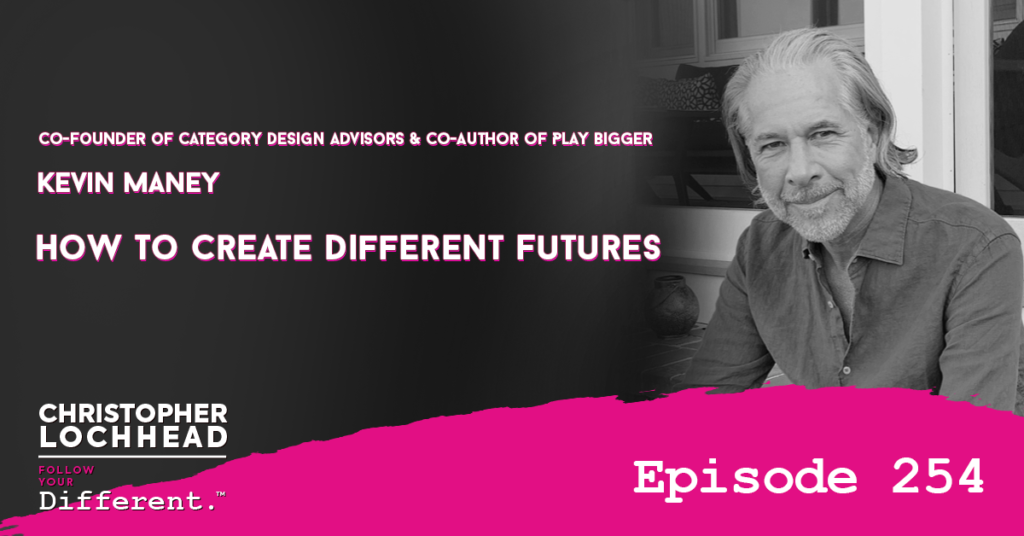
Podcast: Play in new window | Download (Duration: 1:13:19 — 50.3MB) | Embed
Subscribe: Apple Podcasts | Spotify | Pandora | RSS | More
As we all know, Context is everything. Around here, we believe that thinking about thinking is the most important kind of thinking. So if you want to design a different future, the context of your thinking matters. In this episode of Christopher Lochhead: Follow Your Different, we discuss context and much more with Kevin Maney.
Kevin Maney is the co-founder of Category Design Advisors, where he and his partners advise CEOs on how to design and dominate market categories. He is also one of the godfathers of Category Design, and one of the co-authors of Play Bigger, alongside Al Ramadan and myself.
We talk about a lot of topics that will help frame your think, and why the barriers to entry for Category Design keep dropping. We also discuss why Category Design is more important now than it was in 2006. To know why that’s the case, stay tuned to this episode.
Kevin Maney On Playing Bigger
It has been five years since Play Bigger came out, and there have been a lot of changes in Category Design over the years. Kevin suggests that they should get together again and pool together what they have learned over the years.
That said, Kevin has noticed a few things that were big drivers of why category creation and design is so important. Some of them they have touched on in Play Bigger, but did not have the bandwidth to delve deeper into. These drivers are what Kevin and the others have been explaining to CEOs over the past years, so they can be aware of how important it is in dominating the market.
Though the most obvious catalyst in the recent years has been COVID. COVID has accelerated the amount of category breakthroughs, mostly brought about by necessity.
“One of the things that always happens in these times of crisis or radical change like wars, a pandemic, or other things that truly shake up the world (is that) everybody starts doing things in different ways, or looking for new solutions. And it really opens up the possibility of creating new things and new categories that didn’t exist before, solving old problems in new ways or, or addressing problems that have never existed before that arise because of what’s going on.” – Kevin Maney
Kevin Maney on the End of Friction
In any business or market, there will always be friction present. One of the friction Kevin talks about is the friction of geography, and how that can affect the market. Because of such frictions, most people are limited to choose what is available, instead of the category leader for that market.
Fast forward to today, and those frictions are slowly being removed. Now that people have access to a wider variety of the market, they will tend to gravitate towards the category leaders of said category. Which makes aiming to be a category leader is a must now, lest you get left behind.
“The more that the friction of geography disappears, the more we can all choose the global, or at least national category leader of any particular category. So that makes it all the more important in whatever business you’re in to try to be that category leader, or you’re really just going to get sucked down the drain.” – Kevin Maney
The Prevalence of Disintermediation Today
The conversation then shifts to how different things are done today compared to just a few years back. In a way, there’s more disintermediation nowadays compared to the .com era. One of the way it’s very visible now is how we consume entertainment. With the advent of different social media platforms, normal people can interact directly with their idols, rather than having to go to concerts or shows.
On the entertainers themselves, the old formula is getting discovered and debuting on TV or film. Nowadays, people could go viral on their own efforts, or at least without the backing of a major corporation and such.
All this because we have reduced the friction required to make things possible. In the early 2000s, you’d need a lot of equipment, money, and know-how to shoot a simple video, let alone have it viewed by people. Now, all that can be done with just your smartphone.
“That’s an insane decrease in friction, and allows for the creation of these new categories. It allows for a niche player to find their audience everywhere in the world, and not just in some little location or some little pocket.” – Kevin Maney
To hear more from Kevin Maney and how you can create different futures for your business, download and listen to this episode.
Bio
Kevin Maney is cofounder of Category Design Advisors, where he works with CEOs and executive teams to develop and execute strategies to design and dominate markets. He is also a multi-time bestselling author and journalist who writes about technology and society.
His most recent book, UnHealthare: A Manifesto for Health Assurance, was co-authored with venture capitalist Hemant Taneja and Jefferson Health CEO Steve Klasko. It came out in 2020, and tees up how healthcare will evolve in the post-Covid era.
His previous book, Unscaled: How AI and a New Generation of Upstarts are Creating the Economy of the Future, was co-authored with Hemant Taneja and came out in 2018.
His book Play Bigger: How Pirates, Dreamers and Innovators Create and Dominate Markets (Harper Business, 2016), is a collaboration with Silicon Valley veterans Al Ramadan, Dave Peterson and Christopher Lochhead. The book introduces business to the idea of category design and gave birth to the advisory firm Category Design Advisors, where I’m now a partner.
He co-authored, with TIBCO CEO Vivek Ranadive, The Two-Second Advantage: How We Succeed by Anticipating the Future…Just Enough. Merging brain science and computer science, it was a 2011 New York Times bestseller, and predicted much of the conversation we’re now having about artificial intelligence.
He also co-wrote Making the World Work Better, which marked IBM’s centennial in 2001. More than 600,000 copies are in print in a dozen languages.
His other books include Trade-Off: Why Some Things Catch On, and Others Don’t, The Maverick and His Machine: Thomas Watson Sr. and the Making of IBM and Megamedia Shakeout.
Over the years, he’s been a contributor to Fortune, The Atlantic, Fast Company and ABC News, among other media outlets. He was a contributing editor at Conde Nast Portfolio during its brief run from 2007 to 2009. For 22 years, he was a columnist, editor and reporter at USA Today.
He’s appeared frequently on television and radio, including CNN, CBS Sunday Morning and NPR, and lectured at conferences and universities, including New York University, UNC in Chapel Hill, and his alma mater, Rutgers.
Kevin also plays music with other New York rockers in a band called Total Blam Blam.
Links
Follow Kevin Maney today!
Website: KevinManey.com | CategoryDesignAdvisors.com
LinkedIn: in/KevinManey | company/CategoryDesign
Facebook: fb.com/CategoryDesign
Twitter: @KManey | @CD_Advisors
Instagram: @CategoryDesign
We hope you enjoyed this episode of Follow Your Different™! Christopher loves hearing from his listeners. Feel free to email him, connect on Facebook, Twitter, Instagram, and subscribe on iTunes!
134 The Problem With Most Marketing Plans
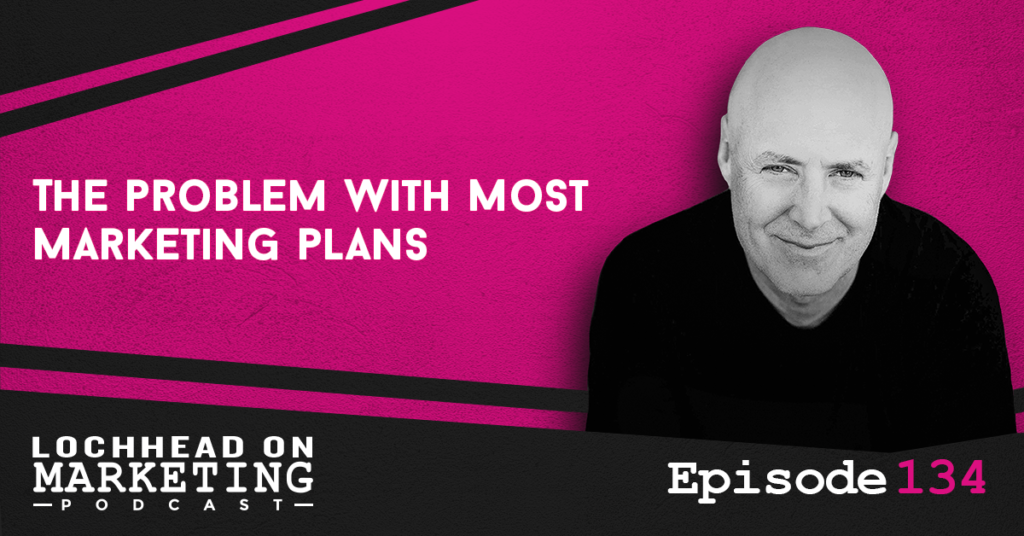
Podcast (lochheadonmarketing): Play in new window | Download (Duration: 11:17 — 7.8MB) | Embed
Subscribe: Apple Podcasts | Spotify | RSS | More
In this episode, let’s talk about the problem with most marketing plans, and what you can do about it.
Welcome to Lochhead on Marketing. The number one charting marketing podcast for marketers, category designers, and entrepreneurs with a different mind.
Planning Based on the Past
Let’s talk about the problem with most marketing plans: mainly, most of them start with last year’s template.
The big problem with most marketing plans is they take last year’s marketing plan and they extend it forward. In category design, one of our favorite expressions is to reject the premise. In the end, we challenge ourselves to push and poke and stretch our thinking. Also, just because it worked in 2020 or 2021, it is not evidence that it will work in 2022.
More importantly, when you start your planning by rejecting the premise, you create a blank sheet of paper.
Crowding Out Innovation
It is also difficult to create a different future when the past is your lens. So if a prior marketing plan is the start point for a plan for the future, by definition you’re taking the past and figuring out how to re-implement it going forward.
That might be feasible for maintaining certain market margins and the like, but it risks crowding out innovation in your marketing plan.
We’re also not telling you to reject the past and just YOLO your future. Going forward, you should have a dialogue on what worked and not worked based on the data from the past, find a way to highlight those points, but at the same time look for things that have not been explored in the market. That way, you can produce a breakthrough in a new field or even create a new category out if it, without having to go for broke.
Three Pillars of a Great Marketing Plan
Once you have rejected the premise and open yourself up to thoughtful data-centric analysis of what works and doesn’t, it’s time to think about going forward. How do you design a marketing plan that creates the future of your choosing?
To do so, try to anchor it around these three pillars.
- Information Wars: This is what sets the strategic context. It’s the combination of ways in which you educate the world about the category you’re designing, and learning from your Superconsumers to accelerate your effectiveness both in the air and on the ground. This is more focused on POV marketing / word of mouth than anything else.
- Air Wars: In many ways, marketing is “Sales at scale.” Air Wars are the high-level strategic marketing you do in service of the new and different category you are creating in the world. All the while positioning yourself as the leader. These efforts are more focused on demand creation.
- Ground Wars: This is tactical marketing (often at the point-of-sale and heavily integrated with sales) that supports your strategic efforts marketing the category and driving near-term revenue. These efforts are more focused on demand capture and lead generation.
If you want to learn more about these three pillars, check out this Category Pirates article about it.
Conclusion
So in closing, what would I leave you with?
Don’t use the past as a template for creating the future.
Allow yourself to think in unconstrained, super creative, super innovative ways around “what is the strategic context?” “What’s the POV that you are using to drive your category and your brand and ultimately, the success of the company?” How are you scaling through air wars, so that you begin to make your strategic point of view move from being a new thing to an of course. And the ground Wars is all about how you make the cash register sing and drive near-term revenue. And guess what? To succeed, you got to get all three right.
Bio
Christopher Lochhead is a #1 Apple podcaster and #1 Amazon bestselling co-author of books: Niche Down and Play Bigger.
He has been an advisor to over 50 venture-backed startups; a former three-time Silicon Valley public company CMO and an entrepreneur.
Furthermore, he has been called “one of the best minds in marketing” by The Marketing Journal, a “Human Exclamation Point” by Fast Company, a “quasar” by NBA legend Bill Walton and “off-putting to some” by The Economist.
In addition, he served as a chief marketing officer of software juggernaut Mercury Interactive. Hewlett-Packard acquired the company in 2006, for $4.5 billion.
He also co-founded the marketing consulting firm LOCHHEAD; the founding CMO of Internet consulting firm Scient, and served as head of marketing at the CRM software firm Vantive.
We hope you enjoyed this episode of Lochhead on Marketing™! Christopher loves hearing from his listeners. Feel free to email him, connect on Facebook, Twitter, Instagram, and subscribe on Apple Podcast! You may also subscribe to his newsletter, The Difference, for some amazing content.
253 America’s Biggest Problem: The Lack of Authentic Dialogue
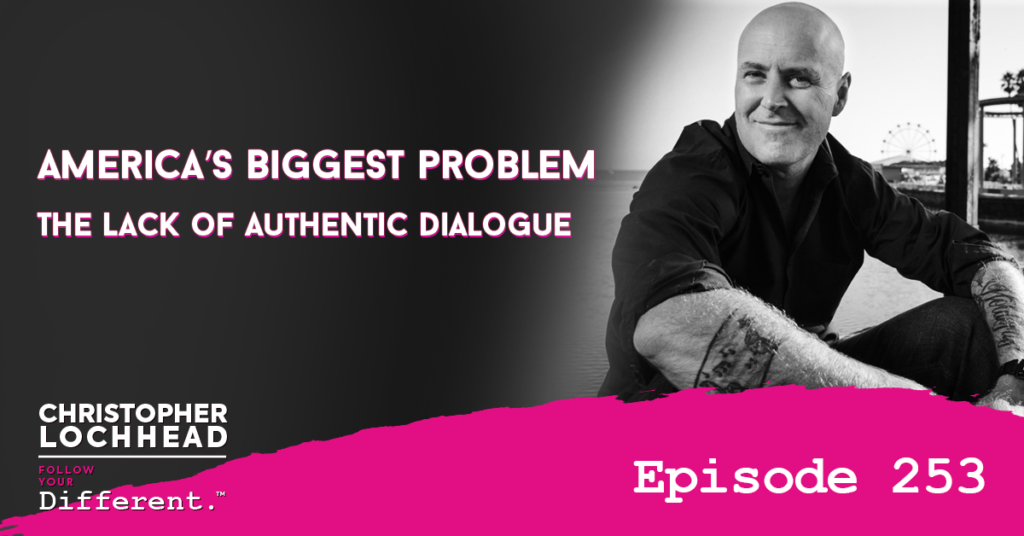
Podcast: Play in new window | Download (Duration: 6:42 — 4.6MB) | Embed
Subscribe: Apple Podcasts | Spotify | Pandora | RSS | More
In this special solo episode of Christopher Lochhead – Follow Your Different, I just want to share with you an element of conversation around the most recent Kyle Rittenhouse case. What I wanted to talk about is America’s biggest problem when it comes to situations like this. That is, the lack of any authentic dialogue about the matter.
Too Much Yelling, Not Enough Listening
Regardless on where you come out of the issue, there are some things that wasn’t properly address or we didn’t hear from at all. What I hoped we’d hear more was thoughtful, nuanced dialogue and conversation. Instead, what we got is what we’ve been getting a lot of in the United States of late, which is yelling and hardened positions. You’re only pro or anti-something. As part of that, whatever one side does, if you’re on that side, everything they do is right, and everything the other side does is wrong, and vice versa.
I think that’s really sad. Because thinking about thinking is the most important kind of thinking. And it’s only through dialogue, where human beings can achieve greater levels of understanding. There was no dialogue sparked by this horrible circumstance, horrible situation around what do we as Americans want to do about protests and riots? There wasn’t a discussion about that. Nor was there a discussion about self-defense, what do we mean by self-defense? Who decides where there’s a line where we can no longer defend ourselves or not?
“What I do know is we’re not having conversation. We’re not having dialogue. There’s a lot of yelling, and not a lot of listening.” – Christopher Lochhead
Bring Back the Willingness to Listen
If you’re a long-time listener of this podcast, you know that our mission has always been to celebrate real, authentic dialogue. In our case, dialogue around what it takes to design legendary business and legendary life. In hopes that we can bring back curiosity, we can bring back a willingness to listen, a willingness to co create our lives and ultimately, our culture and country together.
I got to tell you: sometimes, particularly of late, it feels like we’re losing that war. We might even have lost it completely, and we might never get it back. But I do know that a conversation about authentic dialogue, and why we don’t have it, and how we can have more is an important thing to do, even if very few people want to participate in that.
Bio
Christopher Lochhead is a #1 Apple podcaster and #1 Amazon bestselling co-author of books: Niche Down and Play Bigger.
He has been an advisor to over 50 venture-backed startups; a former three-time Silicon Valley public company CMO and an entrepreneur.
Furthermore, he has been called “one of the best minds in marketing” by The Marketing Journal, a “Human Exclamation Point” by Fast Company, a “quasar” by NBA legend Bill Walton and “off-putting to some” by The Economist.
In addition, he served as a chief marketing officer of software juggernaut Mercury Interactive. Hewlett-Packard acquired the company in 2006, for $4.5 billion.
He also co-founded the marketing consulting firm LOCHHEAD; the founding CMO of Internet consulting firm Scient, and served as head of marketing at the CRM software firm Vantive.
We hope you enjoyed this episode of Follow Your Different™! Christopher loves hearing from his listeners. Feel free to email him, connect on Facebook, Twitter, Instagram, and subscribe on iTunes!
252 Drunk: How We Sipped, Danced, and Stumbled Our Way to Civilization with Professor Edward Slingerland, Distinguished Scholar and Professor of Philosophy UBC
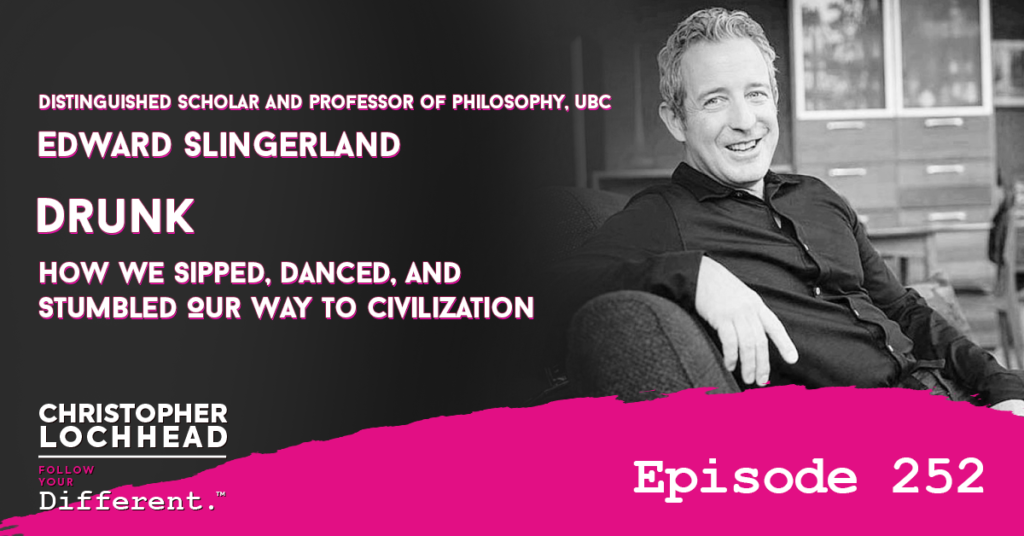
Podcast: Play in new window | Download (Duration: 1:21:34 — 56.0MB) | Embed
Subscribe: Apple Podcasts | Spotify | Pandora | RSS | More
Almost everything academic ever written about drinking and alcohol is centered on why it is bad for us. In this episode of Follow Your Different, we have the audacity to ask, “How does drinking and getting drunk make a difference to humanity?” And to answer that question, we have Edward Slingerland with us.
A bit of a disclaimer before we proceed: it is clear that for some people, drinking is a horrible thing. If you’re somebody for whom drinking represents a problem, then please know you have our thoughts and empathy. However, this episode is one that is going to celebrate the difference that drinking has made to society. Our guest today delves into that and more on his new book that studied how drinking is great for us as a society.
Professor Edward Slingerland is a distinguished university scholar and professor of Philosophy at the University of British Columbia, Canada. His new book is called Drunk: How we sipped, danced, and stumbled our way into civilization. We dive deep into that and more on this episode, so stay tuned.
Edward Slingerland on Getting Drunk
Prof. Edward shared that he had fun writing his book, Drunk. On one hand, it’s a topic people are interested in a lot, because it’s about drinking. For Edward, it’s also a mystery worth exploring, despite most people not even realizing it.
Finding books about different drinks and how to get drunk around the world is easy. Finding one about why people like getting drunk, is not.
“I don’t think anyone’s ever explored just the underlying question of why we like to get drunk in the first place. And so, it’s fun to actually problematize something that people take for granted.” – Edward Slingerland
Evolutionary Hijacks
So, why do we get drunk? The easiest answer is that it makes us feel good. But that’s not really an answer, according to Prof. Edward. That answer just opens up another one, which is “why does evolution allow us to get drunk?” In simpler terms, “Why?” This is the central mystery that Prof. Edward wants to explore.
The standard story we’ve been told in psych textbooks is that it was an evolutionary mistake. We somehow discovered something that just happened to randomly hijack reward circuits in our brain. So as clever primates, we figured that we could just take a shortcut and feel good without doing anything.
Prof Edward likens it to masturbation, which is another evolutionary hijack. Orgasms given us pleasure, and pleasure is the best carrot that evolution has to encourage us to pass on our genes to the next generation. Yet we have managed to hijack that with all sorts of non-reproductive sexual hijacks.
“But evolution lets us get away with that because it’s not interested in a perfect system. It’s happy with good enough. And this system is good enough.” – Edward Slingerland
Although unlike masturbation that old people say will make you blind, excessive alcohol consumption will literally blind you.
Reasons to Get Drunk
Despite all that, people have been gathering around the fire and drinking to their hearts content since the start of civilization. This just makes everything all the more mysterious, according to Prof. Edward.
Another thing that Prof. Edward noticed is that the evolutionary mistake story might not have been accurate. For one thing, most of our ancestors that domesticize plants didn’t do it for food. They were hunter-gatherers; they could just simply pick food up in the wilderness. Yet they still tried to grow such plants near their living spaces for easy access.
It was the same for the civilizations that discovered the ancestor of maize. It was a terrible grain to use as a food source, yet people chose to settle and raise this crop. All for the sake of getting drunk. So it was by no means an accident.
“There’s one estimate from ancient Sumer, is that half of the grain production went to making beer. So you’re taking in a place where people are on the edge of starvation, even in large scale civilizations, you’re taking half of your food stuff, and turning it into a chemical neurotoxin, something that’s going to harm your liver, increased cancer risk, lead to, potentially to social chaos, people drink too much of it. The costs that it imposes on humans means that it can’t be a mistake, there have to be countervailing benefits that that pay for the costs. So that’s what most of the book is trying to focus on what those what those benefits might be.” – Edward Slingerland
To hear more from Professor Edward Slingerland and why people love to get drunk, download and listen to this episode.
Bio
Edward Slingerland is Distinguished University Scholar and Professor of Philosophy at the University of British Columbia, where he also holds appointments in the Departments of Psychology and Asian Studies.
Educated at Princeton, Stanford and UC Berkeley, he has taught at the University of Colorado, Boulder, the University of Southern California and the University of British Columbia.
Dr. Slingerland is an expert on early Chinese thought, comparative religion and cognitive science of religion, big data approaches to cultural analysis, cognitive linguistics, digital humanities and humanities-science integration.
He is the author of several academic monographs and edited volumes from Oxford and Cambridge University Press, a major translation of the Analects of Confucius, and approximately fifty book chapters, reviews, and articles in top academic journals in a wide range of fields, from psychology, cognitive science and linguistics to Asian studies, philosophy, religious studies and international relations.
He is the recipient of several book, research innovation and teaching awards.
Dr. Slingerland’s broad research goals involve exploring the potential of novel digital humanities techniques, introducing more psychological realism and evolutionary perspectives to cultural studies and philosophy, and getting scientists to understand the importance and value of humanistic expertise—especially when it comes to research areas such as literature, ethics or religion.
His first trade book, Trying Not to Try: Ancient China, Modern Science and the Power of Spontaneity (Crown 2014), ties together insights from early Chinese thought and modern psychological research.
His second, Drunk: How We Sipped, Danced and Stumbled Our Way to Civilization (Little, Brown Spark June 2021), targets the standard scientific view of our taste for intoxicants as an evolutionary accident, arguing instead that alcohol and other drugs have played a crucial role in helping humans to be more creative, trusting and prosocial, thereby easing the transition from small-scale to large-scale societies.
Dr. Slingerland is also Director of the Database of Religious History (DRH), an online, quantitative and qualitative encyclopedia of religious cultural history, based at UBC and involving a large international network of postdocs, editors and contributors.
As primary investigator, he has received over $11 million in grants to support projects exploring the origins of religion and their role in supporting large-scale societies or developing innovative digital humanities techniques and platforms.
Dr. Slingerland also teaches two popular MOOCs on the edX platform on “Chinese Thought: Ancient Wisdom Meets Modern Science” and “The Science of Religion.”
Slingerland is a US-Canadian dual citizen. He was born in New Jersey and spent fifteen years in California (San Francisco and Los Angeles) before moving to Vancouver, BC, to take up his position at UBC.
An avid ocean kayaker, gardener, cook and appreciator of wine, he splits his time between Vancouver, Canada and Northern California.
Links
Website:
Twitter: @Slingerland20
Check out his book: Drunk: How we sipped, danced, and stumbled our way into civilization
More about Professor Edward Slingerland:
WSJ: Drunk review: Two cheers for happy hour
NYTimes: A History of Getting Hammered, and Why Some of Us Should Keep Doing It
We hope you enjoyed this episode of Follow Your Different™! Christopher loves hearing from his listeners. Feel free to email him, connect on Facebook, Twitter, Instagram, and subscribe on iTunes!
133 Creating Categories, Movements, & Startups with Sangram Vajre, WSJ Bestselling Author of MOVE
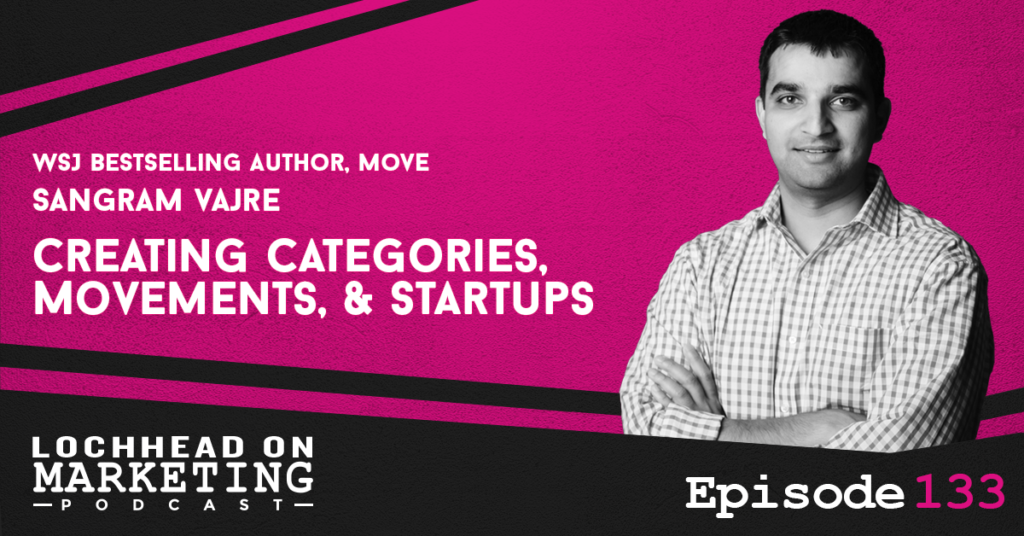
Podcast (lochheadonmarketing): Play in new window | Download (Duration: 1:40:24 — 68.9MB) | Embed
Subscribe: Apple Podcasts | Spotify | RSS | More
On this episode of Lochhead on Marketing, we go on a deep dive into category design, community building, to starting a company and becoming a category leader with Sangram Vajre.
Sangram Vajre is the co-founder of Terminus. He is also the author of a WSJ bestselling book called MOVE: The 4-Question Go-To-Market Framework.
We touch on the different startup marketing topics, including how to avoid the SaaS Valley of Death. We also talk about how to build a scalable marketing and sales model. Most importantly, we talk about how to leverage your competition to build your category.
Welcome to Lochhead on Marketing, the number one charting marketing podcast for marketers, category designers, and entrepreneurs with a different mind.
Sangram Vajre on his Bestselling Book, MOVE
Sangram shares the one question that he always gets when he talks about his book. That is, why did he put THAT specific quote on the cover?
The particular quote was made by me, and it read: “Love the guys, but hate this book.”
Sangram explains that he has a good reason for putting it up right in front for everyone to see.
“I think you and I both know that everybody feels like they’re walking on eggshells. They can’t say anything. Everything has to has to be politically correct. Everything has to be in agreement.
I think people have forgotten a good way to discourse. That it’s okay for two people to have completely different opinions. And that’s the point of being people. Otherwise, we’ll be animals eating each other.” – Sangram Vajre
Coming in from Another Angle
Sangram then explains that while his heart bleeds category design and creation, he believes that not every company should be a category creator. To him, there are some that are not destined to be category creators, and that is fine. They could still be a better company; they just have to approach it from a different angle.
That’s where his book, MOVE, comes to play.
“There are 99% of the companies out there in the world, who probably are following suit to become a better company. And this book is for them. If you want to build a category, go and read Play Bigger. But if you want to build a great high performing revenue team in your organization, I hope you’ll take a look at my book.” – Sangram Vajre
Sangram Vajre on Engaging the Community to Create a Bestseller
Sangram talks about his process on making this bestseller of a book. He says that he has always believed that without a community, you’re just a commodity.
“I truly believe that every company needs to think about building a community before they think about the product they want to build. Because your community is what’s going to give you the float that you need to get your business going.” – Sangram Vajre
So consult the community, he did. He would send out early parts of his book and asked people for their feedback. Those that gave him feedback, he made sure to acknowledge in his book. So when the book became a WSJ bestselling book, his community who gave their feedbacks are now part of it, which gave his community an even greater sense of belonging.
To hear more from Sangram Vajre and how to become a high-performing company in your market, download and listen to this episode.
Bio
Sangram Vajre is the co-founder and chief evangelist of Terminus. Before Terminus, Vajre led the marketing team at Pardot through its acquisition by ExactTarget and then Salesforce.
He is also the author of Account-Based Marketing For Dummies and is the mastermind behind #FlipMyFunnel.
Links
LinkedIn: in/SangramVajre
Twitter: @SangramVajre
Check out his book: MOVE: The 4-Question Go-To-Market Framework
We hope you enjoyed this episode of Lochhead on Marketing™! Christopher loves hearing from his listeners. Feel free to email him, connect on Facebook, Twitter, Instagram, and subscribe on Apple Podcast! You may also subscribe to his newsletter, The Difference, for some amazing content.
251 Unlocking Native Digitals with Hannah Grady Williams, author of Unlocking Gen Z
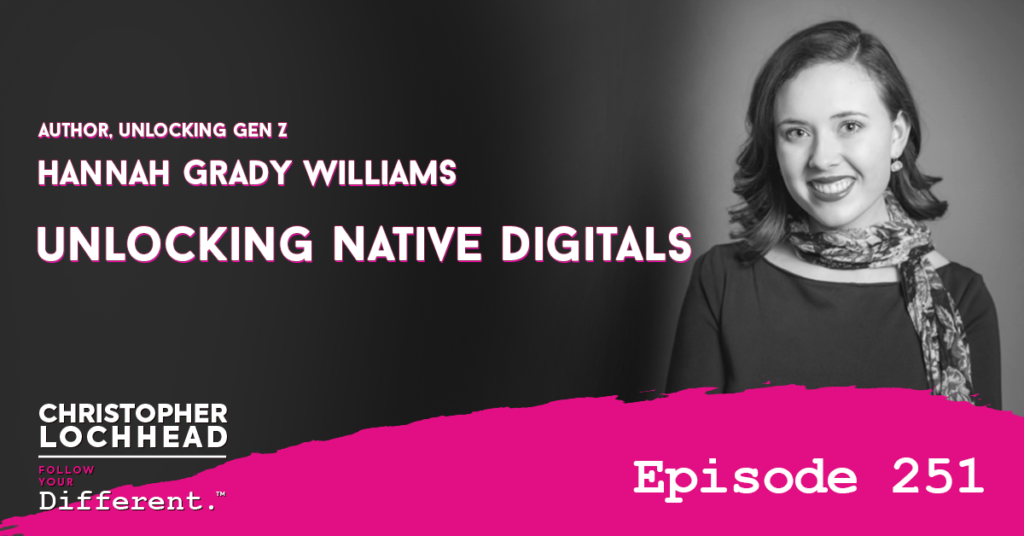
Podcast: Play in new window | Download (Duration: 1:32:47 — 63.7MB) | Embed
Subscribe: Apple Podcasts | Spotify | Pandora | RSS | More
Welcome to part two of our Native Digitals series here at Follow Your Different. On this episode, we have a conversation with Hannah Grady Williams on how your business can tap into the Native Digitals workforce. For those who are not familiar of what Native Digitals are, give part one of this series a quick listen (FYD 250).
Hannah Grady Williams is the Gen Z CEO Advisor, sort of like a Gen Z whisperer for CEOs and executive. She is the author of a new book called A Leader’s Guide to Unlocking Gen Z: Inside strategies to empower your team.
If you are over the age of 35, which is a Native Analog, this is a must-listen podcast. Because Hannah has a tremendous amount of insight for how Native Analogs can bridge the gap to work, recruit, and build our companies with a whole new slew of Native Digitals workforce.
Generation Differences: Gen X vs Gen Z, Native Digital vs Native Analog
When asked if the generation differences also coincide with the category of Native Analogs and Native Digitals, Hannah says that there are overlaps, but they are not completely the same. These overlaps are more on how each generation treats technology.
“Well, Gen Z, you think about all the kids sitting around the table constantly on their phones, not paying attention to anything. To you, you think it’s a distraction or something that’s taking my mind and my presence away from the people around me. The way I see it is a door that opens me to experiences I never could have had in my natural environment. As I’ve grown older, I’ve realized that distinction of the way that my generation looks at the world.” – Hannah Grady Williams
How Native Digitals Use Technology, and Why Analogs Don’t Get It
Hannah then talks about the time his brother mentioned what he has learned from Tik Tok. If you are a casual user, you might think that the platform is just all dance and viral memes. Yet there are people who use the platform to share important life lessons and tips they have learned themselves, in digestible, bite-size content.
Sadly, most parents’ reaction to someone just spending their time on social media is to just strip their phones or tablets from them. Rather than engaging with them and understanding, they just stop the activity. Because again, to them that is all just distraction.
“What they don’t realize, you know, if I’m looking from a Gen Xers perspective, or a Boomer’s perspective, I think of technology maybe the same way as any other technological innovation that might distract you from family time at the dinner table. But the way my generation sees it is, not only are we getting access to an entirely new world of people. It’s actually a portal to a new world. it’s a portal, it’s a new way of thinking.” – Hannah Grady Williams
Millennials and Gen Z are the New Category of Humans
Hannah states that Native Digitals is a great way of describing the New Age of Humans that we have now. She also thinks that it will become more pronounced once the next generation Gen Alpha, comes around.
Hannah then brings up a book called Ready Player One. It is about living immersed in a digital world and treating the real world as the alternative. While the real-world economy is at a downfall, it didn’t really matter to its citizens. As their life is spent in their digital selves, they saw no need to be lavish in real life.
While it is an exaggerated version, it does mirror how Native Digitals prioritize their digital lives over their physical ones. You see people buying expensive digital products while in real life, they barely buy new clothes and the like.
That’s what Native Analogs should take note this early. Otherwise, they might be left hanging once almost everything goes fully digital.
To hear more from Hannah Grady Williams and how your business can reel in the Gen Z and Native Digitals of the world, download and listen to this episode.
Bio
Hannah Williams’s story began in a blue pickup truck when her father handed 12-year-old Hannah the phone and asked her to close a deal on an investment property. After this unexpected introduction to the world of entrepreneurship.
She found herself thrust into a climate of innovation, challenge, and opportunity and she enrolled in college at age 14 and graduated with a degree in international business at age 18. Now, as a 23-year old Gen Z, she has consulted businesses from start-ups to Fortune 500 companies and is on a mission to help leaders leverage Gen Z talent as a competitive advantage and build #RadicalEmpathy in the workplace.
Links
Email: ha****@*************ms.com
LinkedIn: in/Hannah-Williams-Experience-Consultant
Read Hannah’s New Book!
A Leader’s Guide to Unlocking Gen Z
We hope you enjoyed this episode of Follow Your Different™! Christopher loves hearing from his listeners. Feel free to email him, connect on Facebook, Twitter, Instagram, and subscribe on iTunes!
250 New Category of Humans: Native Digitals Are Transforming The World & No One’s Paying Attention!
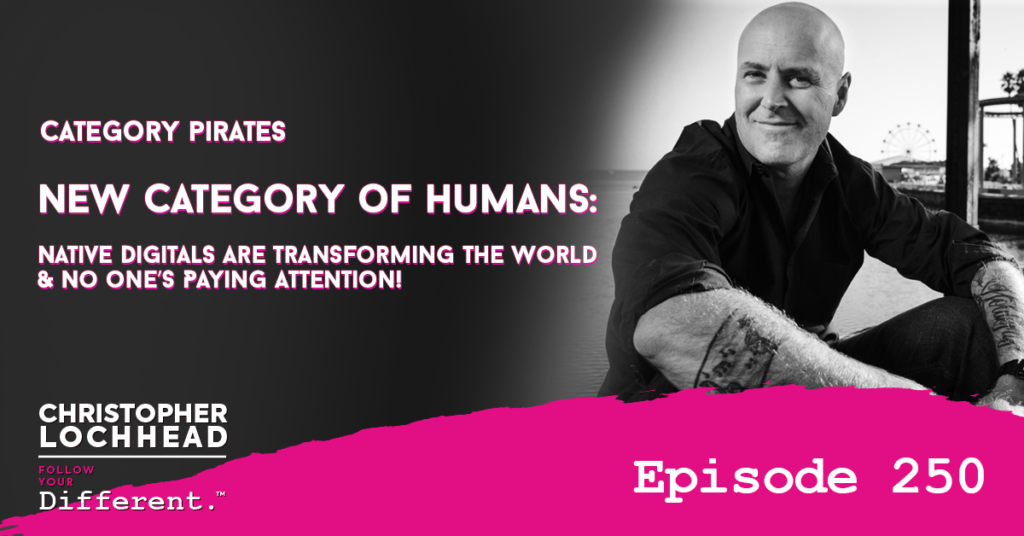
Podcast: Play in new window | Download (Duration: 45:27 — 31.2MB) | Embed
Subscribe: Apple Podcasts | Spotify | Pandora | RSS | More
Originally published in ?☠️ Category Pirates: It’s not a weekly newsletter. It’s a weekly mini-book.
Lately, there has been a fundamental, dare I say, seminal change in the category design of human beings. That is to say, the definition of what a human is has changed. You see, if you’re 35 and up, you are the last of a dying breed called Native Analogs. If you’re 35 or younger, you are the first generation of Native Digitals.
Native Digital’s experience life in a digital first way, and an analog way, second. Native Digitals have come of age integrated with the machines. Your smartphone and technology overall is like part of who you are as a person.
Most Native Analogs do not get this. Most people are not ready for the fact that everything is moving from an analog paradigm to a native digital world. So in this two-part series of Follow Your Different, we explore Native Digitals versus Native Analogs, and how it is important to realize that we are shifting to a digital paradigm faster than you think.
Category Neglect
First off, we start as to why it is important to recognize category shifts like the one we are experiencing now. Most category kings and queens tend to fall into a trap, in which they ignore new categories that may be adjacent or indirectly related to theirs.
When a new category arises (seemingly out of nowhere), the incumbent doesn’t topple over because they were unaware of the new category queen. More often than not, they fall because they dismissed what was happening right before their very eyes.
It’s not ignorance. It is arrogance coupled with the gravitational pull of “the way it is.” Because the people profiting in the present want things to stay the same.
This is called Category Neglect. Category Neglect doesn’t come from people being stupid or lacking sufficient data and resources to spot the headwinds and tailwinds of the future. It comes from a refusal to acknowledge which direction the wind is really blowing.
Why do they fall to such a seemingly obvious trap? This happens because the gravitational pull is too strong. A company gets used to earning hundreds of millions, or billions of dollars per year, and thinks it can do no wrong.
The company becomes deeply invested in the present. Anything that threatens the way it is now is dismissed.
Native Analogs vs Native Digitals
One of the most profound shifts happening in the world today is rooted in the ever-escalating debate between generations young and old. It is a shift hiding in plain sight. Just like the Tymshare executives staring out the window at Apple’s cranes building the headquarters of the company that would ultimately put them out of business, most people over 35 years old can’t see this shift happening.
Instead, they say to themselves, “Eh, we’ve got nothing to worry about.”
As Category Pirates, we feel it is our obligation to sound the alarm when we see rocky shores ahead. Some of us are facing a once-in-a-generation set of headwinds that could not just stymie growth, but sink our entire ship. If those of us over age 35 aren’t careful, this divide could result in one of the greatest instances of Category Neglect.
However, those who see this mega shift and act on it, on the other hand, will sail into the sunset a lot of happy pirates, make more money, and make a way bigger difference in the world.
With that said, let’s first give a better definition of what a Native Analog and Native Digital are. We’ll also define where their biggest difference lies.
There are two types of people on planet earth today.
- The first are Native Analogs. These are Baby Boomers and Gen Xers, born anywhere from the 1940s all the way up to the early ‘80s. Today, they range between the ages of 40 to 75, and make up approximately 136.8 million Americans.
- The second are Native Digitals. These are Millennials and Gen Zers, born between the early 1980s to as recently as the 2010s. These demographics are around 35 years of age on the high end, down to as young as 6 years old. They make up approximately 140.1 million Americans.
The difference?
Native analogs grew up in a time where technology was an addition or a distraction from their real lives.
Native digitals grew up in a time where their “real” lives were a distraction from their digital lives.
This is a profound shift—and no one seems to be talking about it. Even more stunning, some of the largest native digital brands on the planet are run by Native Analogs. Who don’t get it either.
To learn why it is important to know more about Native Digitals and how it can affect your category and businesses, download and listen to this episode. You can also check it out at Category Pirates.
Bio
Christopher Lochhead is a #1 Apple podcaster and #1 Amazon bestselling co-author of books: Niche Down and Play Bigger.
He has been an advisor to over 50 venture-backed startups; a former three-time Silicon Valley public company CMO and an entrepreneur.
Furthermore, he has been called “one of the best minds in marketing” by The Marketing Journal, a “Human Exclamation Point” by Fast Company, a “quasar” by NBA legend Bill Walton and “off-putting to some” by The Economist.
In addition, he served as a chief marketing officer of software juggernaut Mercury Interactive. Hewlett-Packard acquired the company in 2006, for $4.5 billion.
He also co-founded the marketing consulting firm LOCHHEAD; the founding CMO of Internet consulting firm Scient, and served as head of marketing at the CRM software firm Vantive.
We hope you enjoyed this episode of Follow Your Different™! Christopher loves hearing from his listeners. Feel free to email him, connect on Facebook, Twitter, Instagram, and subscribe on iTunes!
132 3 Meta Problems With Facebook
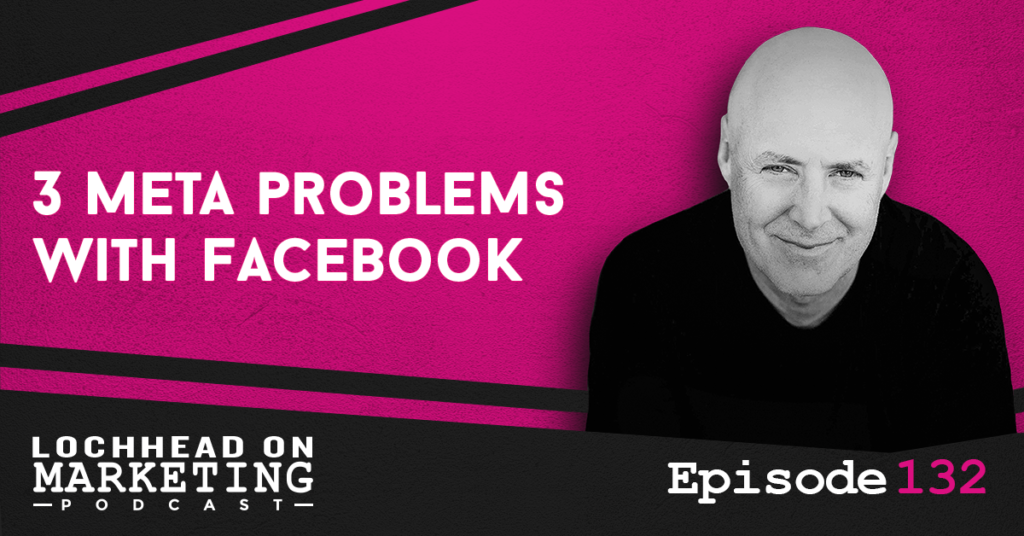
Podcast (lochheadonmarketing): Play in new window | Download (Duration: 12:43 — 8.7MB) | Embed
Subscribe: Apple Podcasts | Spotify | RSS | More
This episode is based on the top 1% Category Pirates ?☠️ newsletter.
On this episode, let’s talk about at least three Meta problems with Facebook. How, in light of their recent situation, they managed to launch a new category out of nowhere. The question is, was it a legendary move?
Welcome to Lochhead on Marketing, the number one charting marketing podcast for marketers, category designers, and entrepreneurs with a different mind.
Launching Meta
There’s an interesting thing that most people don’t realize and has not been reported on the mainstream press. That is, never in the history has a trillion dollar publicly-traded company launched a new category, that is so forward-leaning.
So whatever you want to say about Zuckerberg, what he pulled off there was legendary and by the book, at least from a purely category design perspective.
That said, given the fact that the new category is the metaverse and the fact that he named renamed and rebranded the company as Meta is genius. When you tie your company name to your category, you have real staying power in that category.
The 3 Meta Problems with Facebook
With that out of the way, there are at least three very serious problems with this launch.
Ignoring the Elephant in the Room
Zuckerberg ignored the elephant in the room, and just launched Meta in spite of recent situations developing even as we speak. If you’re interested in this, The Wall Street Journal is keeping an ongoing series on the matter called The Facebook Files.
The most glaring one is the recent whistleblower that exposed the company as someone who exploits its users and their data. Yet for Zuckerberg to just get up and launch a new category, brand, and giant demo is incredible, and not in a good way. Pretending that Facebook does not have a self-inflicted existential wound doesn’t make it go away.
The fact that he didn’t address it is stunning. It shows how much out-of-touch they really are.
Mercenary, not a Missionary
Zuckerberg’s announcement made it clear that he’s a mercenary, not a missionary. This is where he drops off on being a legendary category designer. Because category designers, as you know, are always on a mission.
While making money, building highly-valuable companies, and being economically successful is what we’re trying to do in business, entrepreneurship, and marketing, most legendary category designers and innovators are on a mission to make a difference. They use their category, and therefore their company and products to do so.
If you listen to the Metaverse presentation, it’s 100% about Facebook. They are not solving a new big problem that they have a solution to. There wasn’t a new big opportunity and a way to make a difference for others. Sure, there was an innovation on how VR and the tech behind it was being used, but he never anchored it to why it matters to us.
This is because the new category of Facebook’s Meta is not about us, the users. It is solely for them, and how it benefits Facebook. If you listen carefully, it’s all about me, me, me. That is classic mercenary talk.
Public Trust
Out of the three problems, this one should be the most obvious. If you simply Google around, you’ll find that Facebook is the least trusted social media company. Yet in the whole presentation, he has not mentioned anything about trust, or try to comfort us in anyway.
So the question is, can one of the most nefarious companies in history convince the world to bet their digital lives and future on a dubious, distrusted bedrock of technology from Facebook, without even building trust. He didn’t even try. Like the first problem, he didn’t even address it.
If you’d like to hear more about the 3 Meta Problems with Facebook, download and listen to this episode. We’ll also go into a deep dive about Meta and the issues surrounding it in Category Pirates. So stay tuned.
Bio
Christopher Lochhead is a #1 Apple podcaster and #1 Amazon bestselling co-author of books: Niche Down and Play Bigger.
He has been an advisor to over 50 venture-backed startups; a former three-time Silicon Valley public company CMO and an entrepreneur.
Furthermore, he has been called “one of the best minds in marketing” by The Marketing Journal, a “Human Exclamation Point” by Fast Company, a “quasar” by NBA legend Bill Walton and “off-putting to some” by The Economist.
In addition, he served as a chief marketing officer of software juggernaut Mercury Interactive. Hewlett-Packard acquired the company in 2006, for $4.5 billion.
He also co-founded the marketing consulting firm LOCHHEAD; the founding CMO of Internet consulting firm Scient, and served as head of marketing at the CRM software firm Vantive.
We hope you enjoyed this episode of Lochhead on Marketing™! Christopher loves hearing from his listeners. Feel free to email him, connect on Facebook, Twitter, Instagram, and subscribe on Apple Podcast! You may also subscribe to his newsletter, The Difference, for some amazing content.
249 Decoding Greatness with Social Psychologist Ron Friedman, PhD
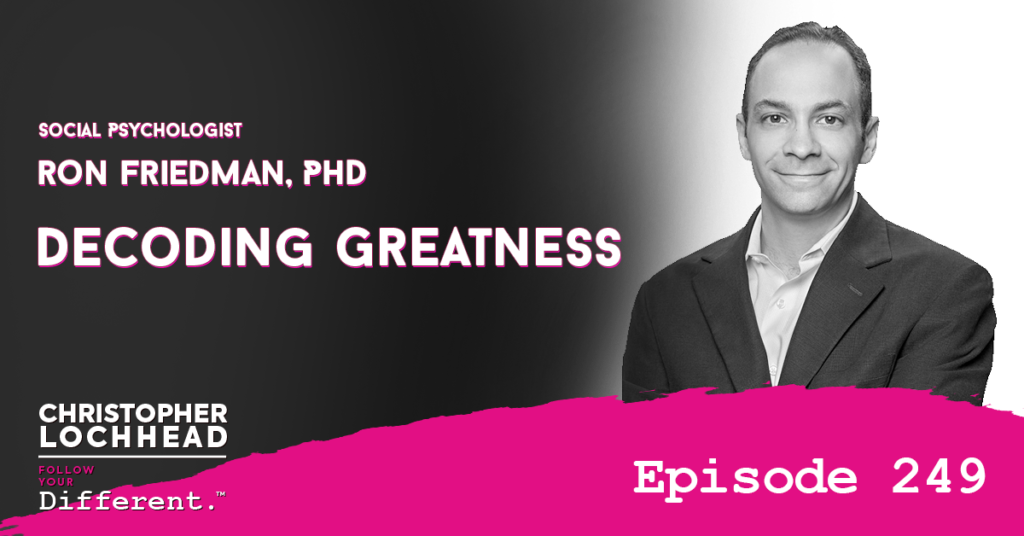
Podcast: Play in new window | Download (Duration: 1:11:07 — 48.8MB) | Embed
Subscribe: Apple Podcasts | Spotify | Pandora | RSS | More
Most people want to have a great life and do great work. But we are told that the way to achieve legendary results is either to have talent, or “practice” 10,000 hours a day. In this episode of Follow Your Different, Dr. Ron Friedman talks about a different, more proven way to achieve greatness that even mere mortals can embrace.
Dr. Ron Friedman is a PhD and award-winning Social Psychologist. He is the author of the no.1 bestseller called Decoding Greatness.
In this episode, we go deep on how you can decode greatness. We also discuss what legends before us have done using their approaches, models, and thinking to turbocharge our lives, our success, and our ability to make a difference.
Dr. Ron Friedman on Decoding Greatness
Dr. Friedman talks about his new book, Decoding Greatness and where he got the idea for it. His first book, The Best Place to Work, focused on giving people access to the best research on what it takes to perform at the highest levels and create a great workplace.
Though Dr. Friedman felt that there was something missing in his first book. He figured that even within a top-performing business or team, there’s still a range of performance levels. Some people are top performers, while some are still great but not at that level yet.
“In this book, Decoding Greatness, I was curious about what is it that top performers are doing differently. And what I discovered is that they’re using a method that most people don’t talk about. And yet it is far more common than we recognize.” – Dr. Ron Friedman
What We were Led to Believe
Dr. Friedman comments that there are two main stories that we are told about when it comes to achieving the highest levels. One of which is that it takes talent to do so, that you have to be born with certain strengths. You then have to match your talents to the appropriate fields that allow those strengths to shine.
Then there’s the big story about Practice. You know the one: 10,000 hours, practice, practice, practice. You have to exert yourself and have the right practice to be able to succeed.
Though according to Dr. Friedman, there is a third story that people don’t often talk about.
“There’s a third story and people don’t often talk about it. Yet it is remarkably common from entrepreneurs to inventors. to marketers. And that approach is reverse engineering, which simply means finding extraordinary examples in your field. By taking them apart, working backward, and figuring out how they were created, you can then apply those lessons to create something entirely new.” – Dr. Ron Friedman
Turning the Gap to a Learning Experience
There are those who say that those who perform at the top level are there because of their talents. Which can be insulting to all the work that person has also done to achieve his goals. Sometimes, people forget that even those who have certain advantages need to work their butts off to achieve greatness.
Dr. Friedman chooses to view it from another angle. He explains that if you apply Reverse Engineering on these extraordinary people and their achievements, you can turn it into a guideline for yourself.
“When you look at extraordinary performances through the lens of reverse engineering, you’ll have a different perspective. That different perspective is, “what can I learn from this? How can I improve my game through unpacking the methodologies and strategies that they are applying?”
So now that emotion, which would have been negative and uncomfortable and probably unhelpful in a way, I can turn that into a positive emotion and apply it to new learnings and insights, because now I have a mechanism by which to understand how he succeeded.” – Dr. Ron Friedman
To hear more from Dr. Ron Friedman and how to Decode Greatness and become a top performer, download and listen to this episode.
Bio
Ron Friedman, Ph.D., is an award-winning social psychologist who specializes in human motivation.
His new book, The Best Place to Work: The Art and Science of Creating an Extraordinary Workplace, has been described as “stunning,” “eye-opening,” and “a contemporary classic,” and praised by best-selling authors Daniel Pink, David Allen, Marshall Goldsmith, Susan Cain, and Adam Grant.
Dr. Friedman has served on the faculty of the University of Rochester, Nazareth College, and Hobart and William Smith Colleges, and has consulted for Fortune 500 companies, political leaders, and the world’s leading non-profits. Popular accounts of his research have appeared on NPR and in major newspapers, including The New York Times, Washington Post, Boston Globe, the Globe and Mail, The Guardian, as well as magazines such as Men’s Health, Shape, and Allure.
He is a frequent contributor to Harvard Business Review, CNN, Forbes, Fast Company, and Psychology Today.
Links
Connect with Dr. Ron Friedman today!
Websites:
LinkedIn: in/RonFriedmanPhD
Check out Dr. Ron Friedman’s bestselling works today!
We hope you enjoyed this episode of Follow Your Different™! Christopher loves hearing from his listeners. Feel free to email him, connect on Facebook, Twitter, Instagram, and subscribe on iTunes!

